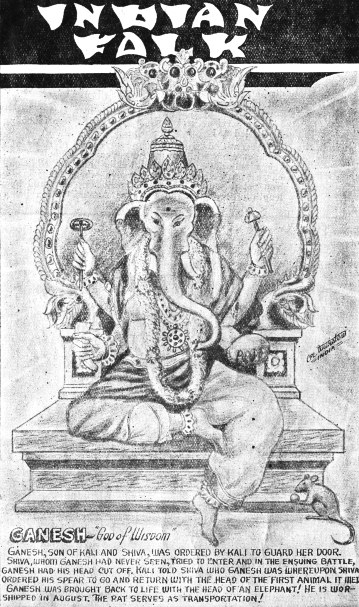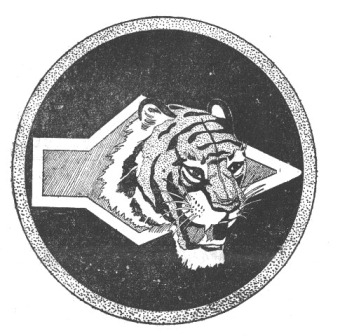

Vol. II No. 24 BENGAL AIR DEPOT May 26th, 1945
Birds Responsible For Fires, Short Circuits On Base
Complaints by the Fire Department, Post Utilities and the Telephone Office have resulted in an all out campaign against the crows by the the local MP detachment.
leading aces of the annihilation squadron, according to T/4 Louis Davis of the MPs, are S/Sgt. Vance O. McClear and Cpl. Leslie Manning who are using 12 and 410 gauge shotguns in their extermination campaign. McClear has become so familiar that his mear appearance causes the crows rapid retreat. Nevertheless, last Sunday he had seven kills and two probables.
Both probables were later confirmed by local bearers but Sgt. McClear only counts those which he actually picks up. "It's hard on the birdies but it's harder on us. I'll sure be glad so see the last of them."
The FD has a long score to settle with the crows. Many of the fires occuring on the Depot can be traced to the crows, including the almost destructive roof fire of last Friday in the new quarters area. In that instance, according to FD's Pfc. Robert I. Budd, a crow had been flying with a length of wire in its claw which touched and electrical wire causing a spark to descend on a nearby basha roof, setting it ablaze. Budd stated that crows have also been known to pick up lighted cigarette butts, fly them to their straw nests in the barrack roofs with fires resulting in a short interval. At other times, crows carry pieces of glass up to their nests which act as magnifiers when the sun hits them.
"We feal certain that the fire ratio will go down once the crows are obliterated," Budd concluded, but the fellows can help us out a lot in the meantime by GI'ing their butts when finished, and by not leaving glass about."
M/Sgt. Richard Forbes of the Telephone Office confirmed the crows' habits of leaving small ends of wires and bolts on the open wire system as well as actually building nests on the wires adjacent to poles. This causes the wires to short or ground, creating a permanent light on the phone system. The telephone trouble shooters must then spend many tedious hours ferreting and correcting the trouble.
AAF, ASC CHIEFS COMMEND RADIO OPS
VAST REDUCTION IN VIOLATIONS REFLECTION ON EFFICIENCY
Radio Operations of the Depot has been commended "for the excellent manner in which they are serving as net control station operators" by two commanding generals, Maj. Gen. George E. Stratemeyer of the AAF, and Maj. Gen. Thomas J. Hanley, Jr. of the ASC, both in the IBT.
Gen. Hanley's commendation read in part: "This Headquarters wishes to further commend the radio operators for the excellent manner in which they are serving as net control station operators. The vast reduction in procedure violations at all stations of the India-Burma Air Service Command net, is a direct reflection on their efficiency. It is believed that further effort can completely eliminate procedure violations on all radio circuits."
Gen. Stratemeyer had originally commended: "...in view of the fact that station personnel have through apparent initiative and diligence, reduced the total errors considerably, in an effort to produce more effective radio communication, and, since the absence of operator chatter, plain language, and security infractions is readily obvious, commendation for excellent improvement is hereby extended."
CWO Joseph P. Vogt, radio officer for Operations, admitted he was very proud of the two commendations which had also been indorsed by Brig. Gen. Frank D. Hackett, CG of the Depot. "However, it is what I more or less expected. Our men under the leadership of chief operator M/Sgt. Palmer Q. Turnheim and trick chiefs S/Sgts. James Ritter, Robert Cook, and T/3 Mitchell Kosakowski have done a splendid job in being the traffic policemen of the airways. The terrific work involved can be ascertained by the millions on millions of words tuned to and controlled since we started operating. We work 24 hours daily and have never shut down once since activating in January 1944."
Sgt. Turnheim was more exuberant: "We have crackajack operators, the best in the IBT bar none. It's our job to direct radio traffic for the whole of IBT and man, do we do it! I'd hate to think of the snarl that would develop if we were not on the ball every minute."
WO (JG) John Anderson, assistant radio officer, pointed out that several thousand messages are accounted for during a day's peak. "All this is in dot-dash code. The men not only tell who has the right of way but must make immediate decisions to direct the flow over the nets. From the commendations, you can see that they have lived up to their responsibilities."
Other radio operators and transmitter men sharing the commendations are Pfcs. Joseph Reardon, Edwin Dolney, John Skrlec; Pvt. Joseph Martin, T/5s Ray Martin, Roy Barnes, Charles Brantley, Robert Burke; Cpls. Cecil Bean, John Burrow, Peter Santelli, Ronald Coulter, Stanley Helm; T/4s Saul Braverman, Robert Brown, Paul Mace, Alexander J. Papp, Peter Zdazinsky, Alan Wilson, Sgt. Joseph Zaha, T/3s Morgan Waugh, Jacob Van Doren, Davide Murphy and M/Sgt. Robert Marshall, chief technician.
MEMORIAL DAY
Next week throughout the United States people will celebrate Memorial Day. It is a day set aside to honor the nation's war dead, the one holiday which does not call for rejoicing and gaiety.
Harking back to our memory of the occasion it had lost a great deal of its meaning. It was a day for picnics, games and pleasures. Double-headers were the order of the day.
We have since become engaged in a worldwide war. This war has brought hardship on practically every man, woman and child in one form or another all over the world. It is time that we again learned to celebrate that day in the spirit in which it was originated, to honor the dead who have given their last full measure of devotion to their country.
It should be a day of reverence, a day of dedication to the task of responsibility to those dead. Their death has not meant the end of our responsibilty, rather it marks the beginning of greater taks for each and every day. They have died to make that country a grand place to live. Form Valley Forge to Okinawa they have laid a carpet of deep scarlet which we must tread, which the world must tread to the goal they so nobly strove to attain.
Hunger, thirst, fear, loneliness, pain and death mark that path. It took much courage and sacrifice to carry on. Mothers, wives and children paid and are still paying that price in heartache and loneliness. Can we, the living, afford to ignore all that they put into their country? Can we go on our way content with just enjoying the fruits of their sacrifice?
They fought to make us a great nation. They fought for our freedom today as well as their fathers before them fought for that self-same freedom. It is for us who remain to continue that fight so that when peace comes we can continue to make America great, to keep it a fine place to live in and to finish their task so nobly begun.
Let Memorial Day be a real day of memory. We have seen and heard what can happen to a people, a people with unscrupulous leaders as the Axis nations. We have seen the danger of weakness in some of the smaller nations of occupied Europe and the East. We have seen the grave danger of being indifferent to what is going on about us, having been almost engulfed by our own lack of interest in what went on, which we as righteous human beings should have checked long before it became almost too big to handle.
Let Europe and the entire occupied world remain in our memories, the starving and destitute millions, the concentration camps with their dead and dying, the fox holes, jungles, the hell of battle and disease. Let them remain in our memory. Then let us turn the page and add to that memory the men who have paid so dearly to bring this world back to a decent place to live. Yes, we must always remember that and then we can gather together on this day with a prayer of thanksgiving, a fitting tribute to the heroes, a rededication to the task of being good citizens of the best country we know, discharging our simple duties as citizens to the best of our ability.
Thus we can also rejoice in the celebration of Memorial Day and humbly seek the guidance of God in following the noble example of these heroic dead.
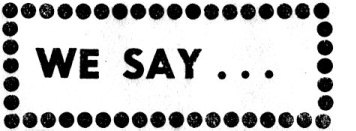
Three GIs, all good men and true, were sipping coffee at the Red Cross canteen the other evening. Between grimaces as they forced the coffee down with doughnuts, they spoke of a subject which most GIs end up with after they've exhausted the San Francisco Conference, the point system, the disappearing five percent discharges and what to do with Germany - women.
It was only after Abbott had summed up his feelings about a girl he'd known, with: "I really liked her.I don't know why - unless it's because she's a girl," that the fellows filed out past the cashier. Paying the munificent cost of the stack was a lengthy process, for each man had to search his pockets carefully to find the number of annas necessary to cover the cost of the sumptuous repast.
The tree men wandered casually out of the canteen and walked to the barracks they regarded as home. Settling themselves in chairs on the porch they lit cigarets, inhaled deeply and exhaled luxuriously.
Bobbie picked up a conversational thread he'd dropped fifteen minutes before when he'd told them about a girl he'd run around with in those long ago, foggy days before the well dressed man wore khakis, navy blues or the dull green of the marines.
"Her heart," he mused, "was like the U.S. Army - open to all men between the ages of 18 to 45." The other two snickered.
"Speakin' of women, as I've been doin' since I grew old enough to appreciate what wonderful creatures they can be." Alf interjected, "d'ja hear about the guy who called his car 'Babe' cause it was like a woman?"
"How d'ya mean his car was like a woman?"
"The way this guy explained it, the similarity between his car and some women was undeniable. His car, he said, cost a lot of dough, is pretty fast, has a perfect shape and is beautifully painted. He spends a lot of money on it and it keeps him broke. See what I mean?"
"Yeah, I mallum," Abbott said demonstrating his ample knowledge of Hindi, "and I also mallum the letter I got from a friend this week. I'd written him about some of the things I've seen here, and mentioned that some of the women wear veils.

|
Alf tossed his cigaret butt into a puddle of water, looked up at the clouds that swirled above - obliterating stars with the rapidity that Patton's armored forces banked German oposition in their final thrusts - and reminisced:
"I learned one important thing in my association with women. Take what you can while you can. Cynical? Not really; it isn't meant exactly how it sounds.
"I recall one night in particular," Alf recounted, "when I really took advantage of that theory...
"I had a date that evening, with a girl who had plenty of money - at least her family did. She had all the clothes she wanted and a sleek beauty of a car for personal use. She took advantage of opportunity by doing some fast stepping with men. She was, you might say, fast, furious and fatuous.
"We danced, dined and went driving in her car. We finally reached a spot in the suburbs of town where all the romantic necessities were a part of the natural surroundings.
"When she stopped the car there - a lonely road shelterd by low-hanging trees that the bright, full moon couldn't penetrate - I realized that I had my chance. It wasn't long before we exchanged kisses. It wasn't much longer that she whispered to me as she lay, cuddled in my arms. 'Darling, you can have anything you want.'"
Alf snorted, "Y'see what I mean when I say you gotta learn to take advantage of a situation?"
"What'ja do, Alf?" one of the fellows eagerly asked.
"What did I do? Why naturally, I asked her to get me a radio like the one she had in her car." - Art Goldberg
FOR YOUR INFORMATION
(This is the fifteenth in a series of articles designed to acquailt you with your allies, the enmy and various phases of the war. For suggestions, contributions and questions, contact the Special Service Office.)
Here are some questions that are commonly asked concerning the offered free education under the G.I> Bill of Rights. We have attempted to answer these questions in as brief a manner as possible.
QUESTION: What is meant by 'ordinary school year?'
Some schools continue for eleven months and other schools stop at the end of nine months, and then there is the summer session intervening.
ANSWER: A letter by Brig. Gen. Frank T. Hines, Administrator of Veternas Affairs, dated 12 September 1944, states:
"The 'ordinary school year' is defined as a period of two semesters or three quarters - not less than thirty nor more than thirty-eight weeks in total length.
Under this definition an institution may be paid as much as $500 for each ordinary school year which is completed, regardless of the time required for such completion.
Thus $500 might be paid for each of four 'ordinary school years' which are completed within three twelve-month periods."
QUESTION: Would the Veternas Administration consider a baseball school a legitimate school?
I refer to one of those run by the various teams in New York.
Would they give me the maintenance benefits if I attended such a school?
ANSWER: A veteran may enroll in any educational or training institution approved by the Veterans Administration.
Bona fide baseball schools are acceptable.
Maintenance benefits will be paid to veterans attending such a school.
QUESTION: Will the government have any policy regarding certain schools that refuse enrollment to men because of race, creed or color, particularly medical students.
To what extent, if any, will the Veterans Administration plug for admission of discriminated men in the future?
ANSWER: The GI Bill of Rights provides that a veteran may attend any school "which will accept or retain him as a student or trainee in any field or branch of knowledge which such institution finds him qualified to undertake or pursue."
The decision on acceptability is left up to the school.
QUESTION: Why were the ages up to twenty-five chosen as the ones where one's education was considered interrupted?
What about those still studying beyond that age but who were unable to attend school for a year or two because of financial reasons?
ANSWER: The GI Bill of Rights was not intended to provide education as such, but to provide education for those whose schooling was interrupted because of Army service.
To quote the exact wording of the message, education is to be provided for a man "whose education or training was impeded, delayed, interrupted by reason of his entrance into the service."
The vast majority of men graduating from college are under twenty-five.
Research among members of the Armed Forces showed that three-fourths of the men who would like to have more education after the war were also under twent-five.
This age, therefore, was set as the age at which education could be assumed, without further evidence, to have been interrupted by war service.
But the Bill also provides that any man over twenty-five is entitled to one year's refresher or retraining course;
and, regardless of a man's age, if he can prove that his education was actually impeded by his entry into the Army, he can complete his entire course, irrespective of time (not over four years) at government expense.
QUESTION: The GI Bill of Rights offers the opportunity for an ex-serviceman to go to school for one year.
I want to work and go to school at nights.
Naturally I can't take a full course in one year if I go to classes at night.
Does the Bill base its one year of study specifications on time or credits?
If it is on credits, I could take the year's course in about two years of night school.
ANSWER: The educational provisions of the GI Bill of Rights provide that every veteran be entitle to at least one year's schooling or "the equivalent thereof in continuous part-time study."
The training allowance, however, is based on the proportion of full-time study which the veteran takes.
QUESTION: One writer says that men over twenty-five are not eligible for the free schooling, while another says all GIs who do not meet the ninety-day qualifying provision or who are discharged under conditions other than honorable are out of luck on the free schooling. Who is right?
ANSWER: The one who states that all GIs can get at least one full year of free schooling is correct.
Only GIs who do not meet the ninety-day qualifying provisions or who are discharged under conditions other than honorable are out of luck on the free schooling.

|
QUESTION: I was just nineteen when I was inducted and have now been in service three years.
How much free schooling am I entitled to?
ANSWER: You are entitle to a full four-year course of study at government expense.
You get one year of school by meeting the ninety-day service qualification and in addition, because you were under twenty-five when you joined up, you get added periods of free schooling measured by your length of service.
The Veterans Administration has ruled that for each month of service a GI can get a calendar month of schooling.
Since the average school year id made up of nine calendar months, twenty-seven months service will give you three years of schooling.
That plus the one year previuosly mentioned, gives you a total of four years of schooling.
Since four years is the maximum, the rest of your service times does not count toward free schooling.
QUESTION: I own a farm and when I get out of service I'd like to take advantage of both the educational and farm-load provisions of the GI Bill of Rights.
Will I be permitted to go to school and borrow money for new equipment on the farm?
ANSWER: You probably will.
A veteran may take advantage of more than one provision of the GI Bill of Rights at a time.
If you can convince your bank that you can attend school and run your farm at the same time, you should have no trouble swinging the loan to buy the new equipment.
QUESTION: I have a wife and three children.
When I get out, I'd like to take advantage of the free schooling.
How much will I receive for substinence while attending school?
ANSWER: You will get $75 a month while attending school.
Every GI who attends school full time will get $50 a month.
Those with dependents get $25 a month in addition.
The number of dependents doesn't matter, since the maximum amount paid is $75.
QUESTION: Before I entered the Army I was studying advertising.
Now that I am older I can see that this was a mistake and that I am best fitted for research in chemistry.
Can I switch over to chemistry or must I continue the course I was studying before I entered the Army?
ANSWER: You can study anything you want.
Under the GI Bill of Rights a veteran can go to any approved school or college and study anything.
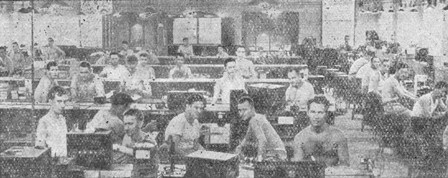 Interior of the Radio Repair Shop with its many appliances and testing equipment.
Because no fans have as yet been installed the men are permitted to work without shirts to alleviate the heat.
Interior of the Radio Repair Shop with its many appliances and testing equipment.
Because no fans have as yet been installed the men are permitted to work without shirts to alleviate the heat.
|
WOULD AMAZE BEN FRANKLIN
If Benjamin Franklin were alive today hw would undoubtedly br fractured with amazement at the gigantic strides electricity and engineering have made since he first flew his kite. And if he visited the Signal Engineering at this Depot he would be paralyzed... completely and without reservation.
For poor old Ben even in his wildest fancy could probably never conceive how so much intricate electrical equipment was invented. And more, how it is repaired by average young men who were speedily trained to synchronize their brains and nimble fingertips and restore faulty equipment to perfection.
In Memory of ben, to help alleviate his wonder, let's give his spirit a break and conduct its glorious curiosity through a tour inside Signal Engineering.
1st Lt. Ralph E. Lampman of Lakewood, Ohio, was, until his departure, the king-pin, Mr. Franklin, and it is largely through his diligence that Signal Engineering is the superb organization it is today. Assigned here in July 1944, Lt. lampman previously received 12 months of tough engineering experience in Egypt. His assitant and stable co-advisor is 1st Lt. Paul Hotte of New Bedfored, Mass. Directly under these two are M/Sgt. Larry S. Gordon of Duluth, Minn., who recently received a commendation from Brig. Gen. A. R. Luedecke for splendid work, and his able coadjutor M/Sgt. Cloice W. Proctor of Ashland, Ohio.
Because Signal Engineering, now headed by Capt. Eugene C. Hess, encompasses many varied departments its operational system is broken down into four units - Radio, Radar, General Repair, Supply and Salvage - with the many specialists assigned where their training fits them. So many men are assigned here, Ben, with a good number of them working on the night shift that it would be impossible to introduce them all although each performa an important function in this organization.
The Radio Repair is located in one huge room filled with long work benches, complete tool sets, and testing appliances of every description. Supervised by 1st Lt. Stephen V. Barry of Cincinnati, Ohio and the NCO in charge, T/Sgt. Paul J. Oliveri of Brooklyn, this 4th echelon shop handles all type airborne and ground materiel, and also tests new apparatus for flaws before release to service.
The men here are noted for their daily conservation of critical material by clever modifications with their testing equipment.
Over there, wearing ear phones and adjusting that dial is T/3 Alfred J. Gottlieb of Haddon Heights, N.J., who is in charge of receivers. Transmitters are rejuvenated under the adroit care of T/3 James A. Snarr of Lebanon Church, Va. Aircraft compasses, those fragile "seeing eye dogs" that guide pilots who are flying blind, are kept alert and true under the guidance of T/4 James J. Mahoney of Arlington, Mass. Dynamotors humming with their invisible power are kept purring under the hands of T/5 Louis A. Demartini of Lodi, Calif.
You haven't heard of this equipment, have you Benjamin? These names - dynamotors, receivers - are no doubt foreign phrases to you. But all of them play a vital role today to accomplish the very dream you held in your heart; namely, to keep people free, and to progress.
That man in charge of amplifiers is T/3 David E. Johnson of Glendale, Calif. The clear movie tones at the Post Theater are tributes to the skill he has for his job. High frequency radios are repaired by T/3 Leslie R. Wands from Hurlock, Md. Wands, Oliveri, Gottlieb, and Mahoney were also stationed in Egypt; the work there was pretty doggoned rough.
Next to this room is the Radar department, also crowded with work benches. because of security reasons little can be mentioned of its innumberable branches. In charge are 1st Lt. Bryant Marvell of Tiverton, RI and 1st Lt. Donald F. Schulenberg of Minneapolis, with a man from Texas, S/Sgt. Elmo L. Bell of Corsicana, as the NCO.
Working on that odd looking machines is T/4 Howard R. Snyder of Washington, N.J.. Snyder had 7 months training on Loran equipment at Camp Murphy, Fla. Censorship and secrecy also veils the job done by T/3 William H. Rein of Detroit, who recorrects navigation instruments under this category. Altimeters, with their uncanny judge of distance, falls to Sgt. Milton L. Lonker of Philadelphia. Other outstanding men are T/4 Stanley P. Tomidajewicz of Youngstown, Ohio and Cpl. Joseph W. Walling of Memphis, Tenn.
Also contained in this section is salvage where parts are reinstated to use or returned to stock. 1st Lt. Kenneth A. Graham of Detroit is the salvage officer as well as supply and S/Sgt. Frederic H. Porter of Ceyenne, Wyo. the enlisted man in charge. 1st Lt. John H. Massie of Philadelphia directs the wrapping and packaging section.
The stock supply boasts over 15,000 different parts, carefully tabulated and neatly lined on shelves or stored in steel compartments. Those two men checking stock records are Pvt. Maurice L. Levy of Boston, in charge, and Pvt. Clarence S. Lewis of Birmingham, Ala. At night, Pfc. Jerome Lindner of Brooklyn shoulders this responsibility of supply and, dreams of Brooklyn.
Do you remember that little sinkhole place over in New York, Mr. Franklin? Well, that's Brooklyn and it has certainly grown. That's the spot where a tree grew, and now New York is practically s suburb attached to it.
Those educated hands there belong to T/3 Oley R. Killingsworth of Palo Alto, Calif. who is repairing a teletype machines. He attended the Western Signal Corps. school at Davis, Calif. Dictaphones are also fixed here, but compared to the teletypes they're simplicity itself, for over 2,000 separate parts compose a teletype. They are a bewildering maze of mechanical and electrical ingenuity.
W/O Chelcie C. Ross heads the general repair department and comes from a Missouri town named Houston. His right hand mechanical sage is T/Sgt. John Lew of Philadelphia. The men assigned here have perfected many novel devices to facilitate quicker repairs.
A machinist from the Bronx, T/4 Nicholas E. palazzo, built a bearing puller adatable to any size bearing. It is especially helpful for bearings in radio compass loops. An electromagnet attached to a vehicle for the purpose of attracting nails has been devised and will countlessly lessen the number of flat tires on this Depot. T/4 Rocco P. Zappile, also from the Bronx, along with his weldin partner T/5 Gordon Tombleson of Portland, constructed a hydraulic barber chair which is utilized comfortably in their orderly room for hair trimming.
S/Sgt. William G. Wilkin of Chester, pa. is responsible for almost all the skillful wiring throughout the shop. Other aids the men have invented include a flexible shaft semi-wrench or screwdriver for removing set screws in inaccessible places. They have made 28 mufflers for power units and have saved much salvage on bearings by running them with compressed air under a load in kerosene.
The power house running these machines is located in that small brick building outside. The men laid the concrete bases as well as built the machines. A major share of the credits should go to T/4 Kenneth Shown of Hartford, Ky.
|
That trailer in front of Signal Engineering contains the instrument branch. Air conditioned, its cool interior is an ideal place to work. T/4 John Merrell of Los Angeles is in charge of this branch. As a sideline, minor watch repairs are performed when the men break their timepieces.
Another New Yorker, 1st Lt. Stanley S. Whiteman, is the Technical Officer. Since many new men have recenly arrived classes are being conducted by Lt. Whiteman to further familiarize the men with their jobs. T/5 Donald H. Wendorff of Hutchinson, Minn. is the technical NCO and besides helping with the classes, travels to outlying Districts for on-the-spot repair to equipment.
Two Chicago men, who handle administration and shipping and receiving respectively, are T/5 Raymond G. Gable and T/5 Howard J. Noble. Gable lives on the west side while Noble resides on the north side, yet both have that same genial windy-city air.
Another key man, Mr. Franklin, is T/5 James E. Borg of Peshastin, Wash., a relephone specialist, who at present is working on a switchboard elsewhere.
These are a few of the highlights of Signal Engineering, a big outfit constantly doing a big job, and still improving as it surges along. That steel shed rising out there is for further convienence. When it's completed all excess equipment will be stored there, as well as repairable items which at present must be brought in from one of the compounds for repair.
A loudspeaker system is installed throughout the building to contact men with the front office. All of this - Signal Engineering - is the progeny, Mr. Franklin, of that far back day when you flew your kite.
W-h-y... what's the matter! Mr. Franklin has fainted!
Pvt. Breger

|
Culled from Tiger Rag Files
A variety show presented by Special Service, featuring Depot talent and the Bengal Tigers orchetra was the big news story in the Tiger Rag... The show served as an introduction to the band, only recently organized. Sgt. Jimmy Alevizos, then as now the band leader, won acclaim for his guitar playing. The Fourth Echelon automotive shop was given eminence as a Depot installation. A letter to the editor complained about the "laundry situation" and wanted to know why the Depot didn't have a band. And talk about the the millenium, an officer kicked about the fact that the swimming pool was off limits to Bengal Air Depot enlisted personnel while SOS GIs were permitted to use it!
The Bell tolls and Beat It Out columns were feuding about their volleyball teams, but "J O" in his unit column said:
"T/3 Guy Messimer and T/4 Earl Bowman have finally discovered the way to get rid of the sags in their beds, and invite any of the men to use their idea. It's a very simple procedure - just take the ropes out of the bed, and nail on boards. Naturally you can't sleep at night, but the bed doesn't sag."
Ground Safety Requires Individual Alertness
In his report for the month of April Maj. Aubrey M. Foltz, Ground Safety Officer, stated that only eleven military accidents were recorded. Since the report was incomplete a comparison with the previous months could not be made.
causes of accidents continued varied, such as slipping in the shower room, sprained ankle playing ball, jeep accident, etc.
Again, the civilian accident frequency rate was higher than that of the military, with most of the accidents occuring in Air Corps Supply and Maintenance.
The AAF Safety Bulletin for April carried remarks by Gen. Arnold in which the Air Force CG stressed the importance of an effective ground safety program among Air Force personnel. "Conservation of manpower... dare not be ignored."
It is up to the individual enlisted men of the Depot to be safety conscious. Be alert.
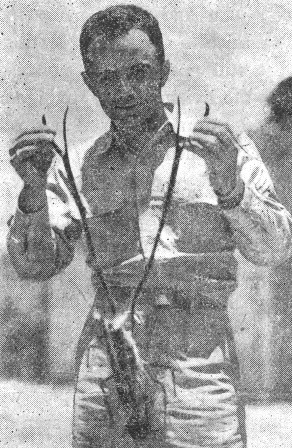
|
INTREPID ANGLERS UNIQUE PRIZE
The unnatural looking object at right with the oversize meat hooks is a prawn. The natural looking object standing directly behind gingerly holding its claws is M/Sgt. Rudy C. Scaglione of a headquarters outfit.
Sgt. Scaglione, with the magnificent aid of Pfc. Angelo Natale and Pfc. James Hollis, captured this unique prize recently in Lake Latrine.
Intrepid anglers all, their total tackle consisted of one line, small, with bait, none, which is certainly an economical way to go fishing.
They detected the prawn lurking amid some moss close to the bank and fearlessly threw out a line. Duly invited, two claws snapped and strove gamely to pull the men in for a showdownRhythm Roundup First Presentation of Beehive with winner take all. But sheer cleverness and courage decided the issue.
Net results - the photo at right.
Rhythm Roundup First Presentation of Beehive
Rhythm Roundup, the ATC GI musical revue, will be served by the Beehive as its initial fare to welcome a Depot Repair outfit to the Shop Area this Tuesday evening.
Produced by T/Sgt. Tony Martin, this will be the premier performance of the Western musical before the show leaves on an all-China tour. Among its assets is Sgt. Harold Harris, one of the original pioneers of movie and radio fame.
The Beehive plans to observe Decoration Day one day late this year. Entertainment, jive and refreshments will attend the Thursday evening affair. Activities will commence at 8 pm.
A program of entertainment has been in full swing at the Shops' new clubhouse since its formal opening May 13th, including a bingo party, a jive concert by the Smoothies, and a conducted tour of the new ARC Sixty Club. The big affair so far has been the successful birthday party last Thursday night for all club members born in May. The celebrants were feted with cakes and were given individual birthday gifts.
|
WO (JG) William Setzler, Administrative Assistant Military Personnel Division emphasized Wednesday that Depot Headquarters has received nothing official on the news report that the Army had lowered to 40 years the age at which enlisted men could apply for discharge.
"It sometimes takes a number of weeks for the exact and approved data to reach us. As soon as anything is received the men will be immediately notified."
Mr. Setzler referred to the Tuesday release of Army News Service that the Army had fixed at 40 years the age at which enlisted men may apply for discharge. An estimated 30,000 EM are in this age bracket. Commanders will be permitted to retain for not more than 90 days any man for whom replacement is not available at the time he requests his discharge.
Local Dance In Town Big Success
Today the men from the Depot who attended the first dance given the the Red Cross at the Army Recreation Center are reminiscing, discussing, and impatiently awaiting the next shindig.
For the dance held last Wednesday night was a lulu and gay with heaven and wherewithal. Heaven in this case meaning the girls, lovely and lots, and the wherewithal representing the Bengal Tigers band which played sweet, solid and strictly substantial.
In addition to the bevy of local cuties who attended, competition for popularity was further enhanced by the Red Cross girls.
Refreshments were served to the appreciative crowd, door prizes were given to lucky ticket holders, and waltzers vied for honors in a closely judged contest.
GI REFUSES BEER
Pfc. Howard M. Stewart of a signal outfit was faced with a dilemma. Should he take the six cans of beer or was ten rupees the better reward? His parched mouth watered as he mentally rolled the ice-cold foaming liquid over his tongue. He thought of the hot evenings and visualized the ads he had read: "kiss of the hops," "one of the world's greatest beers," "choicest barley," "no bitterness," and "the friendly beer."

Again Stewart hesitated, glanced at his sympathetic CO, Capt. Eugene C. hess, wet his lips, straightened his decided shoulders, then croaked: "I'll take the ten rupees, sir."
So it was that the Scottish inheritance of Stewart triumphed over the millions spent in advertising by the beer industry.
Stewart had just won the choice in prizes for submitting a suitable name for his outfit's column in the Tiger Rag. It is: "Intercom."
The artwork that heads the new column was designed by Pfc. Herschal D. Roberts.
Smooth Ice Cream At PX Weekends
Ice cream carrying a double wallop of home and heaven to heat-packed GIs will be sold every saturday and Sunday at the cold drink bar of the PX hereafter.
M/Sgt. Dale W. Willis stated: "It is first come first served. Each man will be entitled to four annas worth. The sales will start just as soon as the ice cream is obtained from the Depot's ice cream factory. They probably will begin about noon Saturdays, and as soon as the PX opens Sundays. This past week we had 75 gallons to serve out."
According to Pfc. Edward W. Stanley, in charge of the Depot's ice cream plant, the increse in ice cream is treaceable to additional personnel enabling full capacity operation. Ed plans to supply GIs with a variety of flavors including maple, coffee, orange and cherry beside the old vanilla and chocolate reliables. Aiding Stanley to keep up capacity production will be T/4 Garland R. Davis of the Mess Office.
Previously, most of the ice cream made has been earmarked for the mess halls which had highest priority.
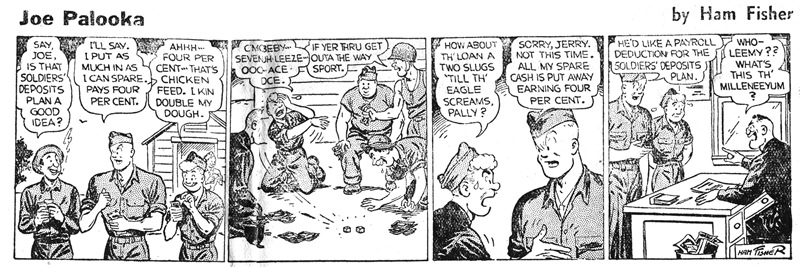

|

|
85 POINTS ENOUGH FOR DISCHARGE
Lt. Archie McGhee, Asst. Depot Statistical Officer, announced this week that enlisted personnel and officers must have a minimum of 85 points before they are eligible to be sent home but that they no longer require 15 months overseas service.
Lt. McGhee quoted a message received from the CG, AAF of the IBT which stated: "Officer and enlisted personnel selected must have minimum score of 85 points calculated by use of official War Department Readjustment Plan multiples. Selectees need not have fifteen months overseas credit. Each AAF IBT organization will revise list of eligible personnel... As in previous selections, all personnel chosen must make written request for immediate separation from active duty."
According to Lt. McGhee, this does not mean that other men stationed here need lose hope. Those GIs who have high credits but lower than the minimum should await the War Department critical score which will be computed as soon as all reports from all theaters are received. Once the critical score is released all men over that number will proceed Stateside! However, they should bear in mind the movie's warning that replacements for certain MOS's must arrive first.
ALERT GIs PREVENT FIRE SPREADING
A Depot barracks fire last Friday which temporarily threatened to damage a considerable portion of the sleeping quarters in the new area was successfully limited to a roof blaze by the initiative of on the spot GIs.
Under the leadership of Sgt. Raymond E. tegtmeyer, the men had organized a ladder bucket brigade and were confining the fire to one basha when two fire trucks and a decontaminetor unit rolled up.
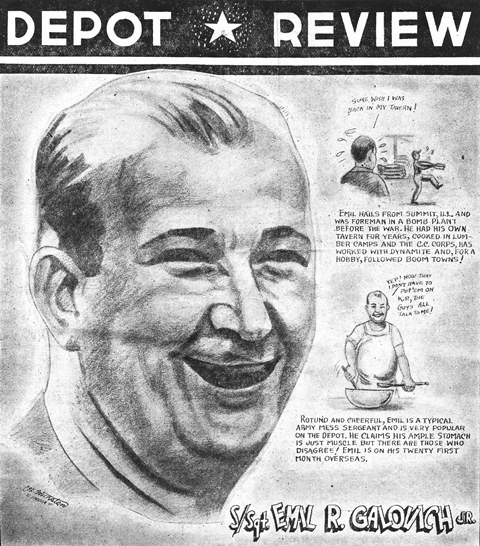
|
The men of Barracks D-15 are still bewailing their luck that had them in the midst of a showdown inspection when the fire occurred. With the falling and smoldering straw, the seeping water and the onslaught, of the Indian crews, quite a mess developed which only now have they succeeded in straightening.
Occuring during the noon hour, the flames and white smoke attracted many onlookers. Brig. Gen. Frank D. Hackett, CG of the Depot, and the executive officer, Lt. Col. Stuart R. Petersen, were among those who hurried up to get particulars and see that everything was okay.
According to Sgt. Joe K. Frame, a crow was the direct cause of the fire. He noticed that the bird, flying from his barracks roof, had somehow created a spark while crossing some electric wires which descended into the straw of the roof. Although Jow watched for a short time, there seemed to be no visible effect. Later Cpl. John Kilcup and Sgt. R.Tegtmeyer walked out to find the roof blazing with sparks blowing towards other barracks.
While John notified the FD, Raymond organized the bucket brigade which did such helpful work. Tegtmeyer could not later name his co-workers being too active and excited to see who was who.
Pfc. Robert I. Budd of the FD, beleives the crow was carrying a wire which when contacting the electrical wires caused the spark that nearly proved so disastrous.
Cake is Baker's Goodbye To Army
Almost drowned by it's creators tears, a delicious five-layer cake, two feet in diameter, served four purposes before it speedily disappeared down hungry GI gullets last week.
Officially, its presence heralded three milestones in the career of T/4 Alfred Pinto, baker de luxe and culinary expert extraordinary. It served as pinto's parting achievement, he's leaving shortly for ShangriLa on the War Department 42 year old and over plan. It feted Pinto's 47th birthday. And it glorified his jubilation in having heard from his brother whom he had been seeking for nearly two years.
Pinto could not control his emotions as the joy of his various good fortunes and the sorrow of his leaving mingled. The tears started flowing as he presided over the cutting of the cake, but the men soon had him his jovial if quiet self and the party progressed its merry way.
Sgt. Pinto gloried with gesticulations at his luck on finding his brother. "Umberto was a captain in the Italian submarine fleet. More than once I imagined him lost in action. It's 20 months since I first tried to get some news and now comes word that he is safe and sound in Taranto, Italy. Can you blame me for being so happy?"
According to Mess Sergeant Emil Galovich, Pinto's departure is going to leave a void. Alfred seemed to pull the necessary ingredients out of thin air to tempt GI appetites with Danish and French pastries while his cakes and pies are a tradition with his outfit.
Alfred received his training in Italy. he migrated to the States after numerous journeys on the luxury liner Conte De Savoia. he was pastry chef at Rome's Italian Restaurant in New York City when the Army grabbed him for its own. Pinto plans to go back to work immediately once he hits Broadway.
|
Falcons Thrash Sad Sacks In Opener, 6-2 The Falcons made a strong bid for one of the final spots in the Depot's Softball Playoffs by taking the first of a best of three game series from the Sad Sacks by heavy hitting, 6-2. Subsequent games have been cancelled by rain and muddy grounds. Kozeliski's two hit hurling kept the Sad Sacks, who tied for third-fourth in the national League, at bay throughout, with the exception of the fourth. Fedewa and Wadle were clipped for twelve hits by the Falcons, who had to win a playoff with the Yardbirds to get into the Depot playoffs. The Yardbirds slashed five hits in the first to tally three runs and drive Fedewa out. Wood opened by drawing a walk and Hardy, Lachapelle and Earle singled in rapid succession after Wood was caught at second on a steal. Young popped to second but McFarland and Motta singled to bring in the second and third runs. Three more runs in the sixth finished the Falcons scoring. Fromader drew a pass. Kozeliski singled, Wood walked to load the bases - and singles by Hardy and Lachapelle, the latter's third hit, brought the runs across. The Sad Sacks got both their hits in the fourth and combined them with a walk and loose infield play to tally both their runs. Goodwin was the recipient of the pass and Cilson and Trupiano singled. Kozeliski walked six of the Sad Sacks while seven Falcons drew free passes to first. Trupiano's two errors were the only boots of the game. Rajah's Rest Rules Roost In Table Tennis Rajah's Rest emerged the undefeated champions in the two month's old Table Tennis Tournament which ended last week. The team had seven victories and no defeats compared to its nearest contender, the Depot's Officers, who had downed six but lost to the victorious Rajah's. Individual cups to the members of the winning combination will be awarded shortly. They are Cpls. Morris Rosen, Irwin G. Curthoys, Pfc. Bing T. Chinn, Sgt. Ben Kanzan, T/Sgt. Alexander W. Joachim, and Cpl. Edward J. Lewtas. Radio had to forfeit their last two games to Weather and Alfsea while Weather forfeited their concluding contest to Ordnance. Rajah's Rest will be host shortly to all league members at which time the battles of the century will be rehashed. |
 SULTANS LOSE, WIN TO REBELS 7-2,
SULTANS LOSE, WIN TO REBELS 7-2, 4-2 IN SEMI-FINAL PLAYOFFS
Ernie Martin's three-hit pitching set the National League Champion Sultans down to a 7-2 defeat in the first game of the semi-final playoffs but the Rebels bowed before the slants of Bojniewicz in the second game, 4-2, to even the nest of three series. Rain has delayed the final game which will decide which of the teams will participate in the Depot's Softball Championship Series.
Martin's defeat, although he permitted only four hits in the second game, was the first for both the Rebels, American League Champions, and himself, in thirteen encounters. When Bojniewicz was trounced in the first game it was the first loss for the Sultans and Bonnie in twelve games.
The Sultans opened and closed the scoring in the first game. After the Rebels notched a run in the second to tie the Sultans' first inning score the Rebels took firm possession of the game. Braces of two runs were tallied by the Rebels in the third, fourth and seventh.
The Sultans' run in the first resulted from Boese's double to deep center and Lawman's long single. Hits by Martin and Jimmy Barr tied it for the Rebels in the next frame.
Infield hits by Perea and Higgins and Talaga's error gave the Rebels two in the third. Two more tallied in the fourth when Kilgore doubled and Kinney singled after Lawman had dropped Dickey Welborn's hit to third.
Perea drew a walk in the seventh and Higgins and Redmon singled for two more runs.
A little scatter-arming gave the Sultans their last run in the seventh. Cappola doubled to right, raced to third on the right-fielder's wild peg to second and scored when Barr tossed wildly to home.
The Sulatns' pitchers, True and Bojniewicz, were clipped for ten hits, although only one was for more than one base, Kilgore's double.
The second game went to the Sultans when they scored twice in the eighth for a 4-2 win - the only overtime playoff game thus far. Bojniewicz and Martin tangled in a tight pitching duel from the first pitch. The Rebels scored first, two runs in the first, and were held runless the remainder of the game.
Perea's bunt-hit opened the Rebels half of the first. Higgins sacrificed and Redmon singled the run home. Lightner's long fly ball to center permitted Redmon to score.
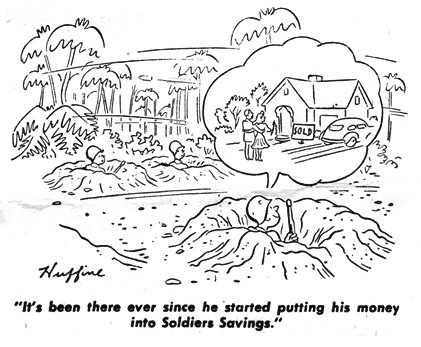
|
The Rebels cut off a Sultans threat in the second when Martin turned a grounder by Talaga into a double play with the bases loaded and one down.
The Sultans were not to be denied in the sixth. With two away Barr dropped Boese's grounder and Lawman worked Martin for a pass. Tegtmeir looped a hit to right to score both runners - with the help of three errors. Wellborn dropped Scataena's throw from right. Barr dropped Wellborn's peg and then threw wild to home. Lightner's glove scaled high in the air as he registered disgust.
The Sultans put across two runs in the top of the eighth to take the game and tie the series. Barto hit through Perea and Smith beat out a bunt. Cappola's bunt advanced the runners who came prancing home on Boese's single to short center.
Three of the Rebels' seven errors were made by Perea.
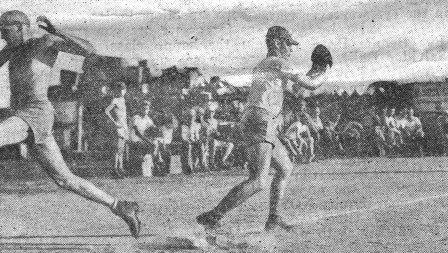

THE TIGER RAG is a weekly publication edited and written by and for the Enlisted Personnel and Officers of APO 492, and is under the direction of the Commanding General, Brigadier General Frank D. Hackett and Public Relations Officer, Major Edward B. Dixson. STAFF: EDITOR... Cpl. William A. Frank; ASSOCIATE EDITOR... Pfc. Art Goldberg; FEATURES... Sgt. Robert J. McCarty, Pfc. John Leonard; ART... Cpl. Layton H. Wicksten; PHOTOGRAPHY... Base Photo Lab. Statements or policies reflected through the columns of this publication under no circumstances are to be considered those of the United States Army. Articles submitted by Officers and Enlisted Men represent personal opinions only.


|
Copyright © 2015 Carl Warren Weidenburner
TOP OF PAGE PRINT THIS PAGE ABOUT THIS PAGE E-MAIL YOUR COMMENTS
CLOSE THIS WINDOW
